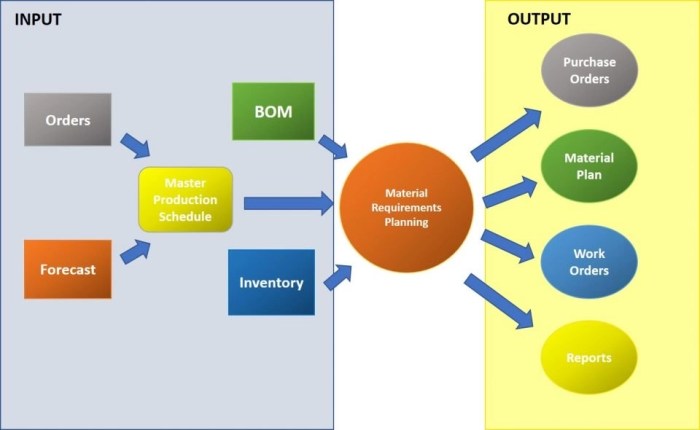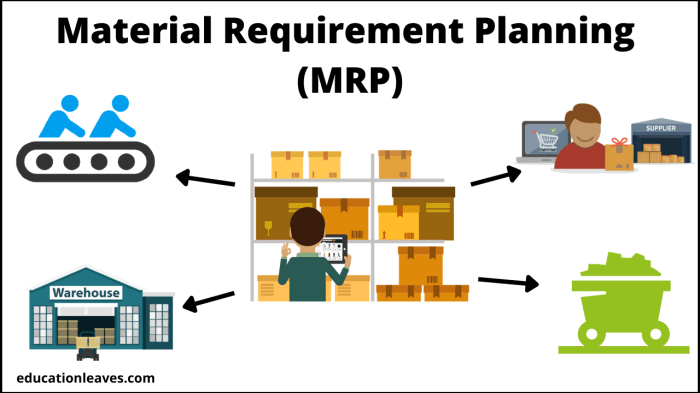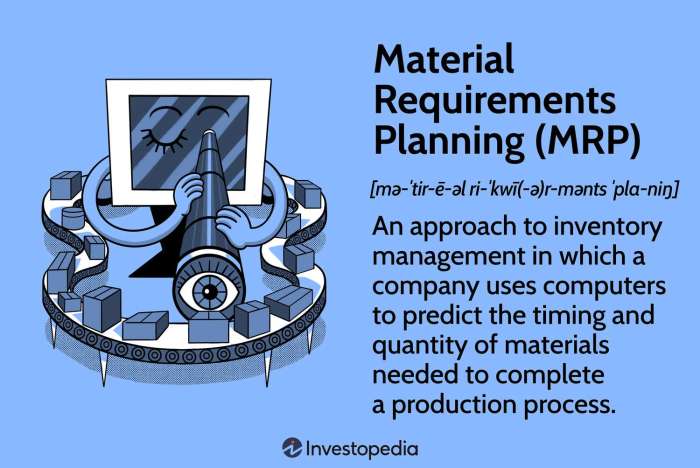An MRP system provides which of the following advantages? This question unlocks a realm of benefits that can revolutionize business operations. MRP (Material Requirements Planning) systems empower organizations with the tools to optimize production schedules, minimize inventory costs, enhance customer service, and streamline production processes.
Embark on this journey as we delve into the transformative advantages of MRP systems.
MRP systems harness the power of real-time data, providing businesses with unparalleled visibility into their production and inventory operations. This enables informed decision-making, reduces waste, and enhances overall operational efficiency. By implementing an MRP system, businesses can gain a competitive edge and achieve sustained growth in today’s dynamic market landscape.
An MRP System Provides Which of the Following Advantages

An MRP (Material Requirements Planning) system is a software solution that helps businesses optimize their production and inventory management processes. It provides a comprehensive view of the entire production process, from raw materials to finished goods, enabling businesses to make informed decisions and improve efficiency.
The following are some of the key advantages of using an MRP system:
Improved Planning and Forecasting
An MRP system helps businesses optimize production schedules and inventory levels by providing real-time data on demand, production, and inventory. This enables businesses to forecast demand more accurately, plan production schedules more effectively, and maintain optimal inventory levels to meet customer demand while minimizing waste and carrying costs.
Reduced Inventory Costs, An mrp system provides which of the following advantages
An MRP system helps businesses reduce excess inventory and carrying costs by optimizing inventory levels based on demand and production schedules. It provides visibility into inventory levels across the entire supply chain, enabling businesses to identify and eliminate unnecessary inventory, reduce storage costs, and free up capital for other investments.
Enhanced Customer Service
An MRP system improves customer satisfaction by ensuring product availability. It provides real-time visibility into production and inventory levels, enabling businesses to respond quickly to customer orders and reduce lead times. This helps businesses meet customer demand, build stronger customer relationships, and increase sales.
Improved Production Efficiency
An MRP system helps businesses streamline production processes and reduce waste by optimizing production schedules, allocating resources, and scheduling maintenance. It provides real-time visibility into production status, enabling businesses to identify and resolve bottlenecks, reduce downtime, and improve overall production efficiency.
Increased Flexibility and Agility
An MRP system helps businesses adapt to changing market conditions and customer demands by providing real-time visibility into production and inventory. This enables businesses to respond quickly to changes in demand, adjust production schedules, and allocate resources accordingly. This increased flexibility and agility helps businesses stay competitive and meet the needs of their customers in a rapidly changing market.
Improved Data Management and Visibility
An MRP system provides businesses with a central repository for production and inventory data, improving data accuracy and accessibility. It eliminates the need for multiple spreadsheets and manual data entry, reducing errors and providing a single source of truth for all production and inventory information.
FAQ Corner
What is the primary function of an MRP system?
An MRP system is primarily designed to optimize production schedules and inventory levels based on real-time demand and production data.
How does an MRP system reduce inventory costs?
MRP systems optimize inventory levels by aligning them with production schedules and demand forecasts, reducing excess inventory and carrying costs.
In what ways does an MRP system enhance customer service?
MRP systems improve customer service by ensuring product availability, reducing lead times, and enabling businesses to meet customer demand more effectively.

